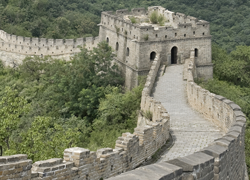“In the Five Principles of Peaceful Coexistence, the principle of sovereignty ranks first. It is the main principle to which the other four principles are related. It is linked to territorial integrity and supplemented by the principles of non-intervention and non-aggression. Equality and mutual benefit is the concrete expression of the sovereignty of a State, while peaceful coexistence is premised upon the respect of the sovereignty of states.”
This passage from Wang Tieya’s 1984 course illustrates the primacy of sovereignty in the Chinese model. It comes as no surprise that China guards its sovereignty so jealously, considering its history of international relations. China sees its sovereignty as being threatened by Western powers and considers this threat to be an affront to the fundamental principles of international law. The theme of sovereignty was just as manifest in Judge Xue’s 2011 lecture as it was in Professor Wang’s 1984 version.
As Judge Xue stated in her lecture, sovereignty is a “perpetual theme for China, both theoretically and practically.” China adheres strictly to this principle and its contents, which require “supremacy internally and independence externally.” In China’s view, sovereignty is and should remain the basis of the world order.

According to Judge Xue, the concept of sovereign equality rejects the existence of supranational bodies. Thus, the European focus on regional organizations and supranational governance is evidence of a paradigmatic shift away from sovereign equality in favor of world government. But the attack of sovereignty does not stop at the border of the European Union. The west’s treatment of developing nations further suggests to Judge Xue that sovereignty is under attack worldwide and requires protection.
Judge Xue stated a belief that the west’s attempts to retain dominance in the formation of international norms and control of international structures are a threat to the sovereignty of developing nations. This phenomenon, according to Judge Xue, explains the focus on human rights and global governance, the frequent use of intervention to achieve these goals, and a weakening of sovereign equality on the whole. From the Chinese perspective, intervention of this sort has its historical roots in overt imperialist goals and continues to this day under a different name. Humanitarian intervention of a failed state has become the norm, regardless of whether the failure is the result of internal armed conflict, economic issues, or human rights violations, as they are properly understood.
From Judge Xue’s criticism of intervention – that it is employed to counter internal armed conflict, economic crises, and human rights violations alike – one can infer that the Chinese issue with the status quo does not lie in the existence of intervention but the indiscriminate use of such intervention. While human rights violations, “properly understood,” may require third party intervention, countries should be left to handle internal armed conflicts and economic crises as they see fit. What constitutes a “proper” understanding of human rights violations is a highly contentious question – one that will be left for Part 5 of this series.
None of this is to say that China sees its role in the international community as that of an autonomous outsider. As Judge Xue rightly noted, no state can act alone, and all states, including China, are bound by treaties that that must be followed in good faith. Moreover, China interprets the term “treaty” broadly to include memoranda of understanding, joint communiqués, and other instruments lacking the formality of a typical treaty. China sees an important role for international law in the area of serious international crimes and has made significant contributions in that area.
However, China strongly prefers to deal bilaterally as opposed to multilaterally and insists on negotiating with a state with which it is in conflict before the international community steps it. It sees international organizations as trying to reshape the international law creation process, silencing the voices of developed countries.
Judge Xue framed the central issue correctly when she said, “The question is, how should states with different systems and values interact with one another on the international stage?” For her, and for China, the answer to that question lies in sovereignty, which consists of substantive equality free from superpowers, respect for internal political decisions, and mutual agreement on freedom, equality, respect for the environment, and respect for human rights.


